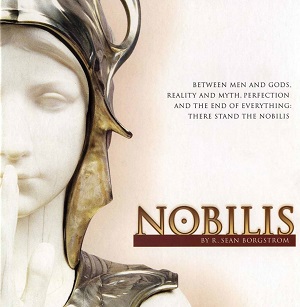I started to feel that I didn’t know roleplaying games well enough so I came up with the plan to read a roleplaying game corebook for every year they have been published. Selection criteria is whatever I find interesting.

Nobilis is a roleplaying game designed by Jenna K. Moran. I read it in the second edition published in 2002 by Hogshead, often referred to a the “great white book” edition. And indeed, as a physical object it’s quite impressive, with a landscape page size bigger than almost any roleplaying game I’ve seen.
There’s a strain of Nineties roleplaying game design where it feels like the initial question that sparks off a creative process is this:
What would be an interesting cosmology?
Mage: the Ascension falls into this category, as does the AD&D Second Edition setting Planescape. Once you’ve come up with a cool cosmological concept, you slowly narrow down to something involving characters, actions and so on.
Nobilis feels like the capstone to a creative era that started somewhere around Amber or The Whispering Vault and spanned many big, thick books describing conceptually interesting thought systems and methods of organizing setting ideas.
In Nobilis, the idea is that the player characters are the titular Nobilis, or Sovereign Powers as the cover also refers to them. Each represents a concept such as trails, deceit or strength. They have awesome powers especially within their own area, able to change the world in a godlike manner.
The Nobilis are fighting a war with the Excrucians, mysterious and beautiful beings who seek to eliminate concepts from the world. For example, a successful Excrucian action would be to remove “strength” from existence as a meaningful category, after which it could no longer be part of the fabric of reality.
For the Nobilis, this is very concrete because they represent those very concepts. The characters serve greater, godlike beings called Imperators. In a metaphysical sense, the player character are shards of a single Imperator, and the players are invited to create this Imperator as part of the character creation process.
The focus on big concepts means that Nobilis revels in brain-bruising paradoxes. The timeline provided at the end of the book casually mentions the invention of time as an event that happens way after the beginning of everything.
In terms of system, Nobilis resembles Amber. It’s diceless and you place points in different categories such as Realm or Spirit. These determine the scope of your abilities. The special powers are quite open-ended, favoring creative player interpretation. This too follows a Nineties trend showing in games like Everway and Mage: the Ascension.
Reading the book, at first I had trouble envisioning what concrete play would look like. In the text, it says that the main focus should be social, characters talking. There’s even a section where an in-game voice called Ianthe (the power of debate) explains how to be devious in one’s social interactions.
Still, the extremely long example of play seems to be more concerned with helicopters and rocket launchers, suggesting a more action-oriented style of play. Fortunately the example adventure at the end of the book helped a lot. There are detailed descriptions of supporting characters and you get a good feel for how they work in play.
In passing the example adventure also suggests a mode of play that to me seems very fruitful. The characters have a Chancel, a small realm of their own they can affect in great detail. Deciding what kind of things exist in the Chancel sounds like fun, a playful category of roleplaying game content where the players can do a bit of setting design of their own.
Nobilis is a grand roleplaying game. The ideas are sweeping, the book is big, the language is flowery. Still, the basic ideas are simple, as befits a game about singular concepts. There’s a war on and it’s about whether ideas exist or not.